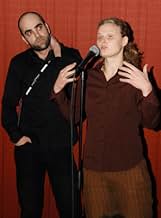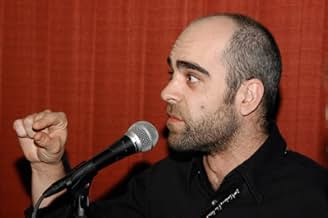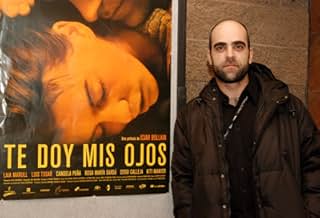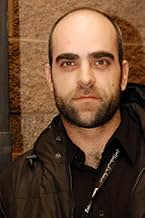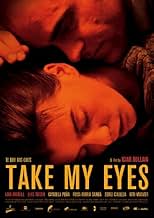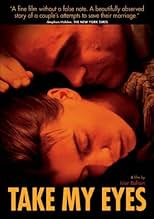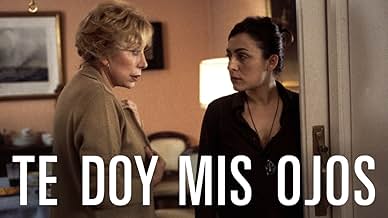AVALIAÇÃO DA IMDb
7,4/10
7,8 mil
SUA AVALIAÇÃO
Adicionar um enredo no seu idiomaOne winter night, Pilar runs away from home. With her, she takes only a few belongings and her son, Juan. Antonio soon sets out to look for her. He says Pilar is his sunshine, and what's mor... Ler tudoOne winter night, Pilar runs away from home. With her, she takes only a few belongings and her son, Juan. Antonio soon sets out to look for her. He says Pilar is his sunshine, and what's more, "She gave him her eyes"...One winter night, Pilar runs away from home. With her, she takes only a few belongings and her son, Juan. Antonio soon sets out to look for her. He says Pilar is his sunshine, and what's more, "She gave him her eyes"...
- Prêmios
- 42 vitórias e 17 indicações no total
Rosa Maria Sardà
- Aurora
- (as Rosa María Sardá)
Kiti Mánver
- Rosa
- (as Kiti Manver)
David Mooney
- John
- (as Dave Mooney)
- Direção
- Roteiristas
- Elenco e equipe completos
- Produção, bilheteria e muito mais no IMDbPro
Avaliações em destaque
The best I can say in favor of this film is that I came out of the cinema with terrible back pain because I had been so extremely tense while watching it. The actors are absolutely brilliant, communicating all that needs to be told, and the plot is never simplistic.
Most European social cinema seems influenced by Ken Loach's movies and this one is no exception. The way time passes slowly and characters try hard to improve their situation reminds a lot of Loach's "Sweet Sixteen", among others.
If there is any weakness to the movie is that I can't say if people who do not share the director's opinions on gender violence would appreciate this movie as much as I have.
Most European social cinema seems influenced by Ken Loach's movies and this one is no exception. The way time passes slowly and characters try hard to improve their situation reminds a lot of Loach's "Sweet Sixteen", among others.
If there is any weakness to the movie is that I can't say if people who do not share the director's opinions on gender violence would appreciate this movie as much as I have.
One of the first negative responses the critics give about the Academy Award is how there is only one award for the rest of the world, that is, Best Foreign Film.
I do like Hollywood films and in fact, about 80% of the movies I watch are Hollywood movies. But this time I am going to write about a Spanish film originally entitled "Te Doy Hasta Mis Ojos", which translates into "Take my Eyes".
The movie is directed by Iciar Bollaín and stars Luis Tosar as Alfonso and Laia Marull as Pilar.
The movie's beginning might as well be a suitable ending with, a determined Pilar and her son running away from home to refugee at Pilar's sister, Ana's house.
The reason and main theme of the movie are soon revealed, Pilar is beaten by her psychotic husband, Alfonso. We then start understanding the difficult, but yet common, couple relationship they live through.
Pilar and Alfonso both love and need each other, which is the main reason why Pilar returns with him. Unfortunately, there are other factors affecting Alfonso, whom even though is attending an anger management program, has several outbursts of anger.
Being the black sheep of his siblings, being at a work he dislikes, and not liking Pilar's new job, which is making him insecure of her faithfulness. The truth is Pilar is only enthusiastic about doing something she likes, her husband misunderstand this leading to the mental disturbing final act.
If I had to briefly describe this movie, I will probably say "Cruelly Real". An uncomfortable feeling is always present. Making you willing to just stop the movie, but at the same time, gluing you to your seat until its ending.
The characters are really well portrayed and even though you feel no sympathy at all for Alfonso, you still try to comprehend the reasons behind his behavior.
I will like to advice it is a really heavy movie but it is surely recommendable, since this is a problem found in societies all around the world, and this movie portrays what a family under this conditions has to live through.
I do like Hollywood films and in fact, about 80% of the movies I watch are Hollywood movies. But this time I am going to write about a Spanish film originally entitled "Te Doy Hasta Mis Ojos", which translates into "Take my Eyes".
The movie is directed by Iciar Bollaín and stars Luis Tosar as Alfonso and Laia Marull as Pilar.
The movie's beginning might as well be a suitable ending with, a determined Pilar and her son running away from home to refugee at Pilar's sister, Ana's house.
The reason and main theme of the movie are soon revealed, Pilar is beaten by her psychotic husband, Alfonso. We then start understanding the difficult, but yet common, couple relationship they live through.
Pilar and Alfonso both love and need each other, which is the main reason why Pilar returns with him. Unfortunately, there are other factors affecting Alfonso, whom even though is attending an anger management program, has several outbursts of anger.
Being the black sheep of his siblings, being at a work he dislikes, and not liking Pilar's new job, which is making him insecure of her faithfulness. The truth is Pilar is only enthusiastic about doing something she likes, her husband misunderstand this leading to the mental disturbing final act.
If I had to briefly describe this movie, I will probably say "Cruelly Real". An uncomfortable feeling is always present. Making you willing to just stop the movie, but at the same time, gluing you to your seat until its ending.
The characters are really well portrayed and even though you feel no sympathy at all for Alfonso, you still try to comprehend the reasons behind his behavior.
I will like to advice it is a really heavy movie but it is surely recommendable, since this is a problem found in societies all around the world, and this movie portrays what a family under this conditions has to live through.
Writer-director Iciar Bollaín's film, TAKE MY EYES (Spain 2003) is full of boldness and nuance, approaching 'full frontal' (almost a pun here) the delicate 'taboo' subject on spouse abuse in love and marriage. The exceptionally talented and selfless portrayal of the couple by Laia Marull as Pilar (the young wife/mother) and Luis Tosa as Antonio (the husband/abuser) made their scenes together - both the tender moments and violent events, convincing and complete. It's heartbreaking to see these two people who could be so in love (felt through the intimate lovemaking scenes, the calm moments they enjoy each other by the river) yet juxtaposed by the traumatic turn of events (seen through the 'explosive' frightful situations). Bollaín, with Marull and Tosa, did not shy away from the volatile subject and key scenes - it is no doubt devastating to behold yet the impact of the situation is truly felt and may also leave us shaking. Kudos to such giving and fearless performances and production decisions.
The Toledo, Spain, locales (especially by the river and bridge) seen in the film are as beautiful as I visited in Fall 2003. I remember the museum where Antonio waited outside for Pilar. He tried. He wanted to be a loving husband to her, but he couldn't help himself. It almost seem like uncontrollable 'alcoholic dependency', his jealous rage generated from fear of losing Pilar, whom he believes he loves in his own possessive ways. While Pilar also tries. She practically loses herself in trying to please Antonio and be 'blinded' by his waves of tenderness towards her. She's struggling to be a good wife and responsible mother to their little boy. She's also trying to find herself through the process.
I recall the wisdom from poet Kahlil Gibran's book "The Prophet" on Marriage: yes, you shall be together forever more, but there should be spaces in your togetherness. "Give your hearts, but not into each other's keeping. For only the hand of Life can contain your hearts." And on Love, that it does not possesses, Gibran said: "And think not you can direct the course of love, for love, if it finds you worthy, directs your course."
TAKE MY EYES gives us a rare chance to observe closely the various aspects/perspectives of a domestic violence situation, and offering viable option on the part of the woman. It may not be an easy film to watch due to frank emotional depiction, but it is superbly delivered by a fantastic cast besides Marull and Tosa. The script, co-written by Bollaín and Alicia Luna, contains supporting storyline (including a wedding and Scottish bagpipes and kilts - cultural diversity, girl talk, men talk, laughs and heartaches). Production is excellent in every respect: cinematography, editing, art direction, music score, sound and all. Highly recommend this film, with no hesitation.
The Toledo, Spain, locales (especially by the river and bridge) seen in the film are as beautiful as I visited in Fall 2003. I remember the museum where Antonio waited outside for Pilar. He tried. He wanted to be a loving husband to her, but he couldn't help himself. It almost seem like uncontrollable 'alcoholic dependency', his jealous rage generated from fear of losing Pilar, whom he believes he loves in his own possessive ways. While Pilar also tries. She practically loses herself in trying to please Antonio and be 'blinded' by his waves of tenderness towards her. She's struggling to be a good wife and responsible mother to their little boy. She's also trying to find herself through the process.
I recall the wisdom from poet Kahlil Gibran's book "The Prophet" on Marriage: yes, you shall be together forever more, but there should be spaces in your togetherness. "Give your hearts, but not into each other's keeping. For only the hand of Life can contain your hearts." And on Love, that it does not possesses, Gibran said: "And think not you can direct the course of love, for love, if it finds you worthy, directs your course."
TAKE MY EYES gives us a rare chance to observe closely the various aspects/perspectives of a domestic violence situation, and offering viable option on the part of the woman. It may not be an easy film to watch due to frank emotional depiction, but it is superbly delivered by a fantastic cast besides Marull and Tosa. The script, co-written by Bollaín and Alicia Luna, contains supporting storyline (including a wedding and Scottish bagpipes and kilts - cultural diversity, girl talk, men talk, laughs and heartaches). Production is excellent in every respect: cinematography, editing, art direction, music score, sound and all. Highly recommend this film, with no hesitation.
From beginning to end this movie is a sea of tension, mostly generated by Pilar's (Laia Marull) stunning fear gestures, and by Antonio's (Luis Tosar) volatile state, leaving the spectators breathing heavily in awe.
With great performances by the entire cast, a solid and incredibly realistic script, an amazing score, and shot in the beautiful town of Toledo, this production grabs you right from the start. Even when the story isn't as disturbing as 'Once Were Warriors (1994)' the characters develop a three dimensional presence to the point of being as complex as a real couple in a self-destructive relationship creating such a drama, that tends to be more psychological than physical.
And even when the conclusion does not represent a drastic overcome, it stands as an example of courage and self determination that will, in deed, prevail in the mind of the viewer, and even more in those who find themselves in the same situation as the protagonist. Kudos to Miss Bollain, this is a good movie, be sure not to miss it.
With great performances by the entire cast, a solid and incredibly realistic script, an amazing score, and shot in the beautiful town of Toledo, this production grabs you right from the start. Even when the story isn't as disturbing as 'Once Were Warriors (1994)' the characters develop a three dimensional presence to the point of being as complex as a real couple in a self-destructive relationship creating such a drama, that tends to be more psychological than physical.
And even when the conclusion does not represent a drastic overcome, it stands as an example of courage and self determination that will, in deed, prevail in the mind of the viewer, and even more in those who find themselves in the same situation as the protagonist. Kudos to Miss Bollain, this is a good movie, be sure not to miss it.
I've already seen this film twice and the subsequent viewing has not diminished much director Iciar Bollain's powerful treatment of domestic violence. In fact, I was actually reluctant to see it again because its potent portrayal of spousal abuse was too disturbing.
There are two things notable about this film that make it stand out from other films on the same subject. One is that it features almost no violence. In fact, there is only one full-blown case of abuse portrayed, and it is less about physical abuse than it is humiliation and emotional abuse.
Another is the nuanced portrayal of the abusive husband. For this, credit must go to actor Luis Tosar, who portrays Antonio. Although the film does its best to give a more balanced portrayal by showing that Antonio does go to therapy and makes some attempt to change his ways, it is Tosar's performance that brings out his human side.
It would have been easy for Tosar to have demonized Antonio, particularly since the actor already a scary appearance, what with his bushy eyebrows and deep-set eyes. But Tosar chooses to take the high road in his performance, focusing on Antonio's deep-seated insecurity and inferiority complex, which are the roots of his violence towards his wife.
His most notable scene is the last one in the film when his wife finally leaves him. As she and her friends go around the apartment packing up her things, the expression on his face is not one of anger but of incomprehension.
But equal credit should be given to Laia Marull, who portrays the wife, Pilar. Because of her performance, the filmmakers literally do not have to show much violence. The literally palpable fear she shows when Antonio is about to go into once of his rages makes that unnecessary.
The film also shows the sexual bond between Pilar and Antonio in order to explain why she continues to return to him despite his abusive behavior, through a frank sex scene that would be possible only in Europe, since American movie makers seem averse to that kind of frankness.
Te doy mis ojos is difficult to watch at times, because of the intensity of its emotional violence. But it is ultimately rewarding for the insights it gives on spousal abuse and the relationship between abusive husband and abused wife.
There are two things notable about this film that make it stand out from other films on the same subject. One is that it features almost no violence. In fact, there is only one full-blown case of abuse portrayed, and it is less about physical abuse than it is humiliation and emotional abuse.
Another is the nuanced portrayal of the abusive husband. For this, credit must go to actor Luis Tosar, who portrays Antonio. Although the film does its best to give a more balanced portrayal by showing that Antonio does go to therapy and makes some attempt to change his ways, it is Tosar's performance that brings out his human side.
It would have been easy for Tosar to have demonized Antonio, particularly since the actor already a scary appearance, what with his bushy eyebrows and deep-set eyes. But Tosar chooses to take the high road in his performance, focusing on Antonio's deep-seated insecurity and inferiority complex, which are the roots of his violence towards his wife.
His most notable scene is the last one in the film when his wife finally leaves him. As she and her friends go around the apartment packing up her things, the expression on his face is not one of anger but of incomprehension.
But equal credit should be given to Laia Marull, who portrays the wife, Pilar. Because of her performance, the filmmakers literally do not have to show much violence. The literally palpable fear she shows when Antonio is about to go into once of his rages makes that unnecessary.
The film also shows the sexual bond between Pilar and Antonio in order to explain why she continues to return to him despite his abusive behavior, through a frank sex scene that would be possible only in Europe, since American movie makers seem averse to that kind of frankness.
Te doy mis ojos is difficult to watch at times, because of the intensity of its emotional violence. But it is ultimately rewarding for the insights it gives on spousal abuse and the relationship between abusive husband and abused wife.
Você sabia?
- CuriosidadesLaia Marull said her role in this film is the one that has marked her career the most. "It was a very intense movie. I remember the scene in which my character is undressed by his partner and urinates on the balcony. It was a very emotional scene. Working with Luis Tosar is very easy because you look into his eyes and he gives you everything," Marull said. For his part, Tosar revealed a secret about that scene: "When we filmed the scene on the balcony, in which she pees on herself out of fear, I remember being with a sponge between her legs, helping her squeeze it so that the trickle would fall out."
- ConexõesReferenced in Todo Mundo Hispânico (2009)
- Trilhas sonorasFarewell To Gibraltar
Canción popular escocesa
Principais escolhas
Faça login para avaliar e ver a lista de recomendações personalizadas
- How long is Take My Eyes?Fornecido pela Alexa
Detalhes
- Data de lançamento
- País de origem
- Central de atendimento oficial
- Idioma
- Também conhecido como
- Leve Meus Olhos
- Locações de filme
- Empresas de produção
- Consulte mais créditos da empresa na IMDbPro
Bilheteria
- Faturamento bruto nos EUA e Canadá
- US$ 30.496
- Fim de semana de estreia nos EUA e Canadá
- US$ 6.440
- 19 de mar. de 2006
- Faturamento bruto mundial
- US$ 6.098.633
- Tempo de duração
- 1 h 49 min(109 min)
- Cor
- Mixagem de som
- Proporção
- 1.85 : 1
Contribua para esta página
Sugerir uma alteração ou adicionar conteúdo ausente

![Tráiler [OVS]](https://m.media-amazon.com/images/M/MV5BNDFiNzRhYTMtODVmNy00OWQ0LTkwMzAtYjRiNGZmNTk4YjhhXkEyXkFqcGdeQXRyYW5zY29kZS13b3JrZmxvdw@@._V1_QL75_UX500_CR0)
